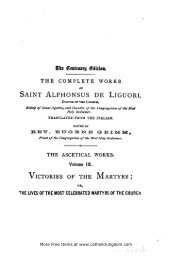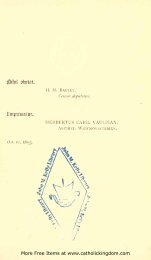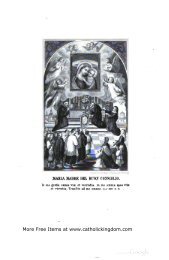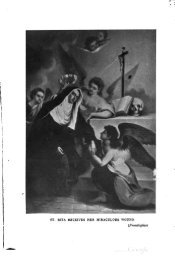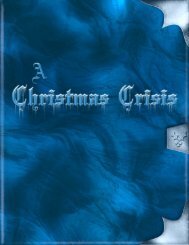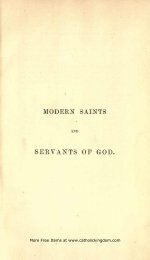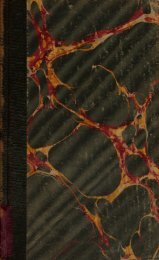Dominican Life_Joret_OCR_CK.pdf - the Catholic Kingdom!
Dominican Life_Joret_OCR_CK.pdf - the Catholic Kingdom!
Dominican Life_Joret_OCR_CK.pdf - the Catholic Kingdom!
You also want an ePaper? Increase the reach of your titles
YUMPU automatically turns print PDFs into web optimized ePapers that Google loves.
DOMINICAN<br />
32<br />
.<br />
LIFE<br />
<strong>the</strong>mselves in this way to <strong>the</strong> observance of those kinds<br />
of regulations." This enactment which St. Dominic<br />
originated and which St. Thomas regarded as so very<br />
wise has since <strong>the</strong>n been extended by ecclesiastical law<br />
to all religious families. Of course, <strong>the</strong> matter of <strong>the</strong><br />
three vows is on an altoge<strong>the</strong>r different footing, and so<br />
is <strong>the</strong> case of a formal precept imposed on anyone who<br />
makes a vow of obedience. But <strong>the</strong>se things do not<br />
affect Tertiaries. On <strong>the</strong> o<strong>the</strong>r hand, what follows in<br />
<strong>the</strong> text of St. Thomas does "<br />
apply also to <strong>the</strong>m. They<br />
may, however, sin, ei<strong>the</strong>r venially or mortally, if <strong>the</strong>ir<br />
conduct proceeds from negligence, passion or contempt." *<br />
Is it <strong>the</strong>n possible for <strong>the</strong>m, by breach of rule, to commit<br />
mortal sin? Yes, in <strong>the</strong> case of contempt. Total and<br />
wilful disregard of <strong>the</strong>ir Rule, which is an authorized<br />
form of Christian perfection, approved by <strong>the</strong> Church<br />
and voluntarily professed, is direct opposition to <strong>the</strong> duty<br />
of seeking perfection<br />
: it is an offence against Holy<br />
Church and it is <strong>the</strong> attitude of an apostate. But contempt<br />
of that sort, St. Thomas considers, is rare, even<br />
amongst those who often fail to keep <strong>the</strong> Rule.<br />
" An act<br />
of transgression or omission," he says, "implies contempt<br />
when <strong>the</strong> will of its<br />
perpetrator rebels against <strong>the</strong><br />
precept of <strong>the</strong> law or of <strong>the</strong> rule, and ,when it is this<br />
rebellious spirit which makes him act in opposition to<br />
<strong>the</strong> law or <strong>the</strong> rule. But when it is a particular motive,<br />
such as concupiscence or anger, which induces him to<br />
infringe <strong>the</strong> law or <strong>the</strong> rule, he is not sinning from contempt<br />
but from some o<strong>the</strong>r motive even should <strong>the</strong><br />
lapse recur frequently for <strong>the</strong> same motive or one similar.<br />
St. Augustine also states that every sin does not originate<br />
in contempt. Never<strong>the</strong>less, constant repetition of a fault<br />
predisposes us to contempt."<br />
If <strong>the</strong>re is no contempt, <strong>the</strong> sin can only be venial :<br />
it will never be mortal, and this should reassure overtimorous<br />
souls. Never<strong>the</strong>less, some measure of venial<br />
sin, slight though it may sometimes be, is always entailed<br />
1 Ila Ilae, q. 186, a. 9.<br />
More Free Items at www.catholickingdom.com



